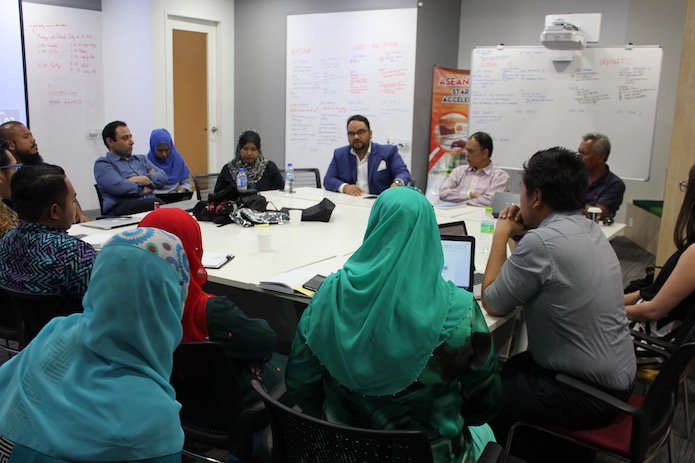

The international open data movement sees governments increasingly invested in their progress and positions within global rankings such as the Open Data Barometer, published this week by the Web Foundation. The Barometer for 2016 does not give a glittering account of overall progress. Indeed, it states that ‘In most cases, the right policies are not in place, nor is the breadth and quality of the datasets released sufficient.’
In spite of this, it is heartening to consider those countries relatively new to open data that are setting themselves ambitious goals to publish and use much more of it – often going against their cultural norms – to bring benefits both to themselves as governments and for their countries' citizens and businesses. In the face of wavering international progress, we ought to watch these countries and their fledgeling open data initiatives. With enough planning, insights into what has and hasn’t worked for others and commitment for sustainable change, they could be where the most immediate, significant progress can be made.
Malaysia is one such country. The Malaysian Administrative and Modernisation Planning Unit (MAMPU) is tasked with driving the movement towards digital and tech across Malaysia’s government departments. Theirs is a broad remit; from procuring Information and Communication Technology (ICT) to developing applications, MAMPU works with departments across the Malaysian Government to keep them up to date with innovative solutions to improve policymaking.
MAMPU became aware of open data in 2014. 'We realised we were a bit late to the game,' Government Chief Information Officer and ‘change agent’ at MAMPU helm Dr Suhazimah Binti Dzazali tells the ODI. Seeing the potential that open data could bring, MAMPU launched an open data portal, data.gov.my, in September 2016 and sought help from experts – from the Malaysia Digital Economy Corporation (MDEC) and the ODI – to navigate the new policy area.
Laying the foundations
MAMPU drive for open data is in keeping with the country’s ICT plan for 2016-2020, which calls for a boom in data-driven initiatives.
The ‘Eleventh Malaysia Plan’, guided by the Malaysian National Development Strategy, also puts emphasis on data, highlighting its potential to enhance service delivery for citizens and, when effectively shared between authorities, help deliver better services at the local level. The plan states: ‘The national open data initiative will allow interactive feedback, transparency, data analyses and open innovation by businesses and individuals.’
The guidance that MAMPU has received from the ODI is helping them to work towards achieving this. Over the past year, the two organisations have worked together to develop a vision for open data in Malaysia, and take the first steps for realising its social and economic impact. This includes connecting Malaysian travel startup WRZIT(who is participating in the ODI and MDEC’s ASEAN Data Startup Accelerator) with data providers in government, including the Ministry of Transport, transport planner Suruhanjaya Pengangkutan Awam Darat and public company PRASARANA.
Improving the data literacy of Malaysians has been another priority. The ODI has developed eLearning modules offering introduction to open data – now available on the portal for all Malaysians to access. The ODI has also helped to equip Malaysia’s officials with the skills to advocate for open data through face-to-face training. Having officials across government who can communicate open data's value and identify opportunities where it can be used to innovate will be important in implementing the initiative.

To help ensure their plans for open data are comprehensive and sustainable, MAMPU is also working with the World Bank on an Open Data Readiness Assessment. These help countries to take into account the things they need to evaluate, design and implement an open data initiative, and ensure they have the best chance of success.
Culture change
While MAMPU can see the benefits of open data, as for many governments new to the area, it is not straightforward to get them across to wider government. ‘Many see data as mundane,’ Dr Suhazimah tell us. ‘It’s our job to bring it to life and get other ministries excited.’
As part of its consultancy for government departments, MAMPU trains them on how to use open data. This includes encouraging them to be less protective of their data. ‘Heads of departments see the value of getting data from other people or departments,’ Dr Suhazimah says. ‘But they must realise they need to contribute as well.’
Showing departments – and citizens more broadly – what is possible with open data more widely available helps them to see the benefits. WRZIT, mentioned earlier, is one such initiative gaining traction. A data-driven app for people to plan bus routes with their phones, WRZIT promises to have transformative impacts both for people’s day-to-day lives and for the economy. Another benefit to government departments is that it ‘forces them to work together and co-create with organisations outside government’, Dr Suhazimah says. ‘Well, forces in a good way!’ she adds. These steps represent a move from individual government agencies solving issues in isolation, towards working in collaboration with other organisations to develop solutions.
Many see data as mundane ... It’s our job to bring it to life and get other ministries excited
As well as more open data publishing and use, data-driven co-creation is something that MAMPU want to see more of for Malaysia – across departments and beyond – with academia, community and industry groups and even other countries. Dr Suhazimah says she is inspired by other countries in Asia who are making good progress in open data, particularly Singapore, South Korea and Indonesia.
Vision for future
The areas that MAMPU are most keen to improve with open data are welfare and wellbeing, health, economic development and education. Indeed, Malaysia is one of the nine governments the Barometer highlights as publishing ’truly open’ education datasets.
MAMPU have set themselves the target of publishing 7,000 datasets to their portal by 2020 to help them achieve their ambition for multi-sector change. Their vision has been endorsed by Malaysia’s Chief Secretary, which should help them to continue to gain traction across departments.
They recently celebrated their own Open Data Day, on 25 May, which marked the release of a new transport app that uses open data from a range of public sector bodies. The app plans to help citizens navigate public transport within Malaysia’s capital Kuala Lumpur and nearby city Putrajaya, with the ability to track buses and identify delays in service. The app’s release was announced by the Deputy Prime Minister Dato' Seri Dr. Ahmad Zahid Hamidi, while he was on the bus that this app will support.
Following this event YB Datuk Joseph Entulu Belaun, Minister in the Prime Minister's Department, will promote the World Bank’s Open Data Readiness Assessment report for Malaysia in supporting seminars and events and help raise awareness of open data across government and civil society.
Anna Scott is Head of Content at the ODI. Follow Anna on Twitter.
If you have ideas or experience in open data that you'd like to share, pitch us a blog or tweet us at @ODIHQ.